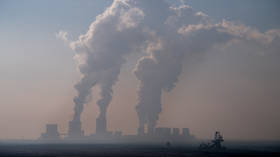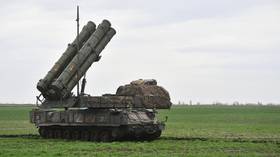Computer modelling for Covid-19 was FATALLY flawed. What if I told you that climate change models are EVEN WORSE?

The parallels between coronavirus and climate change are striking. Pandemic models exaggerated the danger and insisted we must lockdown societies. Climate change models are being similarly distorted to demand zero emissions.
Covid-19 has provoked an enormous debate about the virtues of computer modelling. The scary numbers published by Professor Neil Ferguson's team in mid-March had an enormous impact on the lockdown policy in the UK and were influential around the world.
Ferguson's team suggested 500,000 people could die in the UK without government intervention. Even the original policy of isolating possible cases and members of the same household, along with advice on handwashing, would have led to 250,000 deaths – or so the models claimed.
Also on rt.com Covid-powered: Scientist suggests coronavirus lockdowns ‘SUPERCHARGED’ Cyclone Amphan before it hit India (VIDEOS)Now it seems increasingly clear that those results were an enormous exaggeration that left the UK in a lockdown that has proved difficult to escape from. Applying Ferguson's models to Sweden, which has avoided the extreme measures of other countries, is clear evidence of this. Sweden's death toll has been far lower than Ferguson's models predicted and has, like so many other countries, been substantially caused by a failure to protect care homes for the elderly rather than a failure to lock down society in general.
It would have been far better to appreciate the inevitable limitations of modelling. First, our knowledge of the problem itself – in this case, the virus and how it spreads – is always imperfect. Second, we never have enough data, so it will always be partial. Third, the model itself is always a very rough approximation of the real world, based on projections as to how people behave, the way the economy works, and much more.
Instead, the most frightening numbers take on a life of their own, encouraging politicians to act on the ‘reasonable’ worst-case scenario rather than the most probable ones.
We must learn these lessons from Covid-19 quickly, for there is another alleged threat that has been around for decades, and which will continue to rumble on for many years to come: catastrophic climate change.
Policy around global warming has always been built on complex computer modelling. And the limitations of the modelling in relation to the current pandemic are even more amplified when it comes to predicting how hot the planet will be in the decades to come.
Climate change is a far more complex problem than the spread of a virus. The basic notion that certain gases absorb radiation from the Earth's surface and then re-emit it – the misnamed ‘greenhouse effect’ – has been around for well over a century.
But the direct impacts of this effect are fairly limited. Carbon dioxide and other human-produced greenhouse gases may well make the world warmer, but not so much warmer that we couldn't easily adapt to that change. Indeed, there may well be a net benefit to moderate warming. Even NASA, which has been central to scares about climate change, has noted that rising levels of carbon dioxide may well be helping to increase the growth of plants, including food crops.
The more alarming forecasts for warming come about if temperature rises due to CO2 cause other things to happen which amplify the warming. For example, a warmer world means water vapour in the atmosphere, which is a problem because water vapour is the most abundant greenhouse gas of all. Melting permafrost could release methane that has been locked into frozen soils.
Also on rt.com Slavoj Zizek: Epidemics are like wars, they can drag on for YEARSThe impacts of variations in solar radiation or the changing level of cloudiness are also matters of considerable controversy. We have an improving, but still partial, understanding of the physics.
Data is a really big problem. We didn't have accurate thermometer records around the world until well into the twentieth century. The oceans have only been measured properly in the past few years and the polar regions are still not very well served. Truly global data from satellite records only appeared from 1979.
Modelling how all the different elements of our climate interact is a mammoth task reserved for the world's most powerful supercomputers. But it remains the case that testing computer models is tricky – we want answers in just a few years when testing the models properly could take decades. What we do know is there is a persistent problem with models ‘running hot’ – of overstating warming predictions compared to real-world temperature changes.
What numbers do you even start your models with? When economists struggle to predict how economies will look in 12 months' time, how can you say what the world economy will look like in 30 years' time?
One controversy has been over the representative concentration pathways (RCP) used by climate models. These look at the level of warming impact, or ‘forcing’, from different levels of greenhouse gases, with built-in assumptions about how we might reach those levels of concentration.
Also on rt.com An NHS trust is hiring a climate-change manager amid a pandemic – so should we clap for Greta too?Without getting too lost in the complexity, the fact is that one of these pathways – called RCP 8.5 – is used again and again in studies, but is erroneously and persistently described as ‘business as usual’. In short, it is suggested that if we don't do anything about climate change, the world's temperature will rocket and there will be enormous problems, both for humans and the wider natural world.
As one researcher has put it: “RCP8.5 was never meant to be a business-as-usual scenario, but a high-end scenario, consistent with the highest emissions scenarios in the literature.” The scenario suggests the world population will increase far more quickly than anyone really believes, that we will use more and more energy, that coal burning will rise massively and much more. It's a climate change fantasy and should be treated as such.
In the real world, fertility rates are in decline pretty much everywhere, we're getting more and more efficient at using energy, and we're tending to shift away from coal to other energy sources. Just shifting from coal to gas has had more impact on lowering emissions than anything else.
The parallels between coronavirus science and climate-change science are striking. Pandemic modelling suggested that we must lockdown whole societies. Climate change models are used to demand 'net zero' emissions within 30 years at the most, if not sooner. Anyone who suggests that the solution could be far more damaging than the problem (as with coronavirus) is called a murderer – or worse.
Covid-19 is a real problem that has been grossly exaggerated. It seems to me that climate change could cause some problems too, but that these have been blown out of all proportion by activists and politicians seeking to pursue their own political agendas.
It is vital that we thoroughly interrogate the science, and the models, around both – or we could end up in an even more disastrous situation than the current mess we're in.
Like this story? Share it with a friend!
The statements, views and opinions expressed in this column are solely those of the author and do not necessarily represent those of RT.















